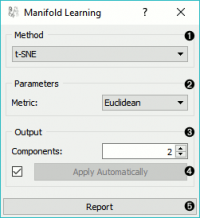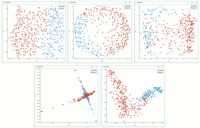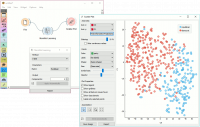Difference between revisions of "Orange: Manifold Learning"
Onnowpurbo (talk | contribs) |
Onnowpurbo (talk | contribs) |
||
| Line 5: | Line 5: | ||
Nonlinear dimensionality reduction. | Nonlinear dimensionality reduction. | ||
| − | + | ==Input== | |
| − | + | Data: input dataset | |
| − | + | ==Output== | |
| − | + | Transformed Data: dataset with reduced coordinates | |
Manifold Learning is a technique which finds a non-linear manifold within the higher-dimensional space. The widget then outputs new coordinates which correspond to a two-dimensional space. Such data can be later visualized with Scatter Plot or other visualization widgets. | Manifold Learning is a technique which finds a non-linear manifold within the higher-dimensional space. The widget then outputs new coordinates which correspond to a two-dimensional space. Such data can be later visualized with Scatter Plot or other visualization widgets. | ||
| Line 18: | Line 18: | ||
| − | + | * Method for manifold learning: | |
| − | + | ** t-SNE | |
| − | + | ** MDS, see also MDS widget | |
| − | + | ** Isomap | |
| − | + | ** Locally Linear Embedding | |
| − | + | ** Spectral Embedding | |
| − | + | * Set parameters for the method: | |
| − | + | ** t-SNE (distance measures): | |
| − | + | *** Euclidean distance | |
| − | + | *** Manhattan | |
| − | + | *** Chebyshev | |
| − | + | *** Jaccard | |
| − | + | *** Mahalanobis | |
| − | + | *** Cosine | |
| − | + | ** MDS (iterations and initialization): | |
| − | + | *** max iterations: maximum number of optimization interactions | |
| − | + | *** initialization: method for initialization of the algorithm (PCA or random) | |
| − | + | ** Isomap: | |
| − | + | *** number of neighbors | |
| − | + | ** Locally Linear Embedding: | |
| − | + | *** method: | |
| − | + | **** standard | |
| − | + | **** modified | |
| − | + | **** hessian eigenmap | |
| − | + | **** local | |
| − | + | *** number of neighbors | |
| − | + | *** max iterations | |
| − | + | ** Spectral Embedding: | |
| − | + | *** affinity: | |
| − | + | **** nearest neighbors | |
| − | + | **** RFB kernel | |
| − | + | * Output: the number of reduced features (components). | |
| − | + | * If Apply automatically is ticked, changes will be propagated automatically. Alternatively, click Apply. | |
| − | + | * Produce a report. | |
Manifold Learning widget produces different embeddings for high-dimensional data. | Manifold Learning widget produces different embeddings for high-dimensional data. | ||
Revision as of 08:54, 29 January 2020
Sumber: https://docs.biolab.si//3/visual-programming/widgets/unsupervised/manifoldlearning.html
Nonlinear dimensionality reduction.
Input
Data: input dataset
Output
Transformed Data: dataset with reduced coordinates
Manifold Learning is a technique which finds a non-linear manifold within the higher-dimensional space. The widget then outputs new coordinates which correspond to a two-dimensional space. Such data can be later visualized with Scatter Plot or other visualization widgets.
- Method for manifold learning:
- t-SNE
- MDS, see also MDS widget
- Isomap
- Locally Linear Embedding
- Spectral Embedding
- Set parameters for the method:
- t-SNE (distance measures):
- Euclidean distance
- Manhattan
- Chebyshev
- Jaccard
- Mahalanobis
- Cosine
- MDS (iterations and initialization):
- max iterations: maximum number of optimization interactions
- initialization: method for initialization of the algorithm (PCA or random)
- Isomap:
- number of neighbors
- Locally Linear Embedding:
- method:
- standard
- modified
- hessian eigenmap
- local
- number of neighbors
- max iterations
- method:
- Spectral Embedding:
- affinity:
- nearest neighbors
- RFB kernel
- affinity:
- t-SNE (distance measures):
- Output: the number of reduced features (components).
- If Apply automatically is ticked, changes will be propagated automatically. Alternatively, click Apply.
- Produce a report.
Manifold Learning widget produces different embeddings for high-dimensional data.
From left to right, top to bottom: t-SNE, MDS, Isomap, Locally Linear Embedding and Spectral Embedding.
Contoh
Manifold Learning widget transforms high-dimensional data into a lower dimensional approximation. This makes it great for visualizing datasets with many features. We used voting.tab to map 16-dimensional data onto a 2D graph. Then we used Scatter Plot to plot the embeddings.


